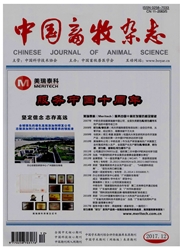

 中文摘要:
中文摘要:
为提高优良公畜的利用率并获得大量高质量的胚胎,畜牧业引入体外授精技术。体外授精技术成功的关键因素之一是精液保存,精液长期保存的方法主要是冷冻保存。然而,冷冻容易使精子受到氧化应激损伤。其中一个原因是体外的精子缺乏机体内氧化一抗氧化体系的保护;另外冷冻会刺激精液产生过量的活性氧(ROS)组分,二者均能削弱精子的抗氧化能力,导致精子的结构和功能受到损伤。ROS是造成氧化应激的关键因素之一,它会影响精子质量,进一步降低胚胎成活率,最终导致动物繁殖能力下降。针对这一问题,科学工作者已研究了大量的改进措施,如添加抗氧化剂、改善精液储存的环境条件,或二者协同处理。目前,抗氧化药物已在体外受精领域取得很大的新突破,但精子受到氧化损伤的问题还未完全解决,本文就目前精子抗氧化方面的研究作一综述。
 英文摘要:
英文摘要:
Animal husbandry technology introduced in vitro fertilization to increase the utilization rate of genetically and phenotypically improve sire and to obtain high number of good quality embryos. One of the key factors of successful in vitro fertilization is semen preservation, cryopreservation is one of the best method for long-term preservation of semen. However preservation easily produce oxidative stress which is harmful for sperm. One of the main reason for this is that in vitro sperm lack the oxidant-antioxidant system protection of the body; Second reason is that the preservation process stimulates the overproduction of reactive oxygen. Both condition weaken sperm antioxidant ability and lead to structural and functional damage of the sperm. One of the key factors of oxidative stress is reactive oxygen species(ROS), which affect the quality of sperm, reduce the survival rate of embryos and decline the animal reproduction ability. To solve this problem, scientifically a large number of improvement measures have been studied such as adding antioxidants, improving conditions for semen storage environment, or both etc. At present, in the field of in vitro fertilization antioxidant drug has made a lot of new breakthroughs, but oxidative damage with sperm has not been fully solved. In this paper, we summarized the antioxidative effect on semen preservation.
 同期刊论文项目
同期刊论文项目
 同项目期刊论文
同项目期刊论文
 期刊信息
期刊信息
